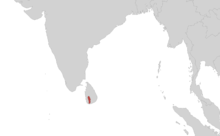| Ichthyophis pseudangularis | |
|---|---|
| Conservation status | |
 Vulnerable (IUCN 3.1) | |
| Scientific classification | |
| Domain: | Eukaryota |
| Kingdom: | Animalia |
| Phylum: | Chordata |
| Class: | Amphibia |
| Order: | Gymnophiona |
| Clade: | Apoda |
| Family: | Ichthyophiidae |
| Genus: | Ichthyophis |
| Species: | I. pseudangularis |
| Binomial name | |
| Ichthyophis pseudangularis Taylor, 1965 | |

| |
| Ichthyophis pseudangularis range | |
Ichthyophis pseudangularis is a species of caecilian endemic to Sri Lanka. It is found in a range of natural and man-made habitats: forests, rubber plantations, paddy fields, rural gardens and farms, wetlands (boggy and muddy areas), and pastureland.
The holotype measured 225 mm (8.9 in) in total length.
References
- ^ IUCN SSC Amphibian Specialist Group (2020). "Ichthyophis pseudangularis". IUCN Red List of Threatened Species. 2020: e.T59631A156587421. doi:10.2305/IUCN.UK.2020-3.RLTS.T59631A156587421.en.
- ^ Taylor, E. H. (1965). "New Asiatic and African caecilians with redescriptions of certain other species". University of Kansas Science Bulletin. 46: 253–302. doi:10.5962/bhl.part.20077.
- Frost, Darrel R. (2014). "Ichthyophis pseudangularis Taylor, 1965". Amphibian Species of the World: an Online Reference. Version 6.0. American Museum of Natural History. Retrieved 14 January 2015.
| Taxon identifiers | |
|---|---|
| Ichthyophis pseudangularis | |
This caecilian article is a stub. You can help Misplaced Pages by expanding it. |